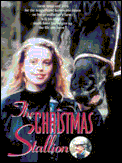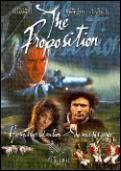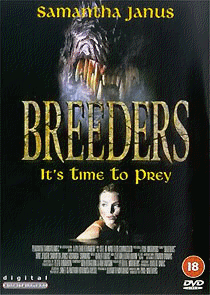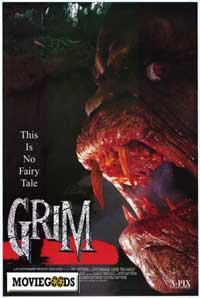|
Find interviews by: | ||
Paul Matthews (Part 1) Though you probably won’t recognise his name, Paul Matthews is one of the most prolific British makers of B-movies. His company PeakViewing Transatlantic has made more than 20 films since 1992, often directed by Paul, usually produced by Paul and his sister Liz. I got quite friendly with the PeakViewing team during my time on SFX and visited two of their shoots: Rampage on the Isle of Man (which was released as Breeders) and Beings in South Africa (which was released as The Fairy King of Ar). PeakViewing films have starred such notable names as Ron Perlman, Robert Vaughan, Malcolm McDowell, Corbin Bernsen, Justin Whalin, Judge Reinhold, Patrick Bergin, Rik Mayall, Tia Carrere, Adrian Paul, David Warner, James Coburn, Edward Woodward, Jurgen Prochnow and Martin Sheen. Not bad for a company based in an end of terrace house just outside Cheltenham, which is where I interviewed Paul Matthews in February 1997. Jump straight to Part 2 of this long interview
"The Christmas Stallion, which we did in Welsh and English - we made two films at the same time. Basically, I had an idea for a film about a wicked land-developer, a 16-year-old girl and horses. It's just a family movie for Christmas really. Liz at the time was running a distribution company called Consolidated and they were working with S4C. They wanted some ideas, so I just gave them that as an idea, then wrote the script. Luckily they liked it, and we made the film." What was your background before that? "Before that I was in the building trade. I was a concrete welder. Nothing to do with films at all." Did that give you the finances to set yourself up doing these things? "Not really. Mostly it was Liz's idea to set up the company and go it alone. It didn't take a lot of money to set it up, really. Since then we've just built it up. After making one film we've made the next and then the next and the next." So each one finances the next one? "Exactly, yes. Well, it keeps the company going, it keeps us going, and then we make another one."
"I'm President of the company, Liz is Chief Executive, Veronica's Financial Control, Janet is Head of Sales, Peter's Head of Post-Production and Production basically and does the editing." Is there an advantage to all being a family working together on these films? "Very much so actually, yes. Because it's working with people that you know, that you trust absolutely. We're all on the same wavelength, which is good. And we all have our individual areas of expertise that we bring to production. Our brother-in-law as well worked on the films. He's Construction Manager on Rampage; he did location work on a couple of the others. So it works very well." How many films have you made so far? "This is the tenth or eleventh. I think it's the tenth, if you count the Welsh and English versions of some of the movies that we do, then this is the tenth." Are the Welsh/English things shot like the Spanish version of Dracula? Do you shoot one thing then shoot it again? "What we do is a take in English, and then a take in Welsh." With the same cast? "We did on two movies. Then on the third one we actually had a different cast. So we had Patrick Bergin and Teresa Russell in the English version, and we had Nicola Beddow and Anurein Hughes in the Welsh version. That was The Proposition, a historic drama about drovers in the 1790s." Why have you gone from doing family and historical things to monster movies? "Really, we started off doing a family Christmas movie; then we did two westerns; then we did another family movie; then we did Grim; then we did Proposition which was a historical drama. And now we're doing Rampage. So we've done family movies, we've done historical drama, we've done sci-fi, we've done horror, we've done westerns."
"The action-oriented movies sell easiest because that's what sells. American-style action movies sell relatively easily. You don't have to be Brain of anywhere to watch them. Which is great. They're pure escapism, which is what I like. I don't like to sit there and be preached at when I watch a film. I like to sit there and just forget about my troubles and watch it as a movie. That's what I like to do." Do you write and direct all of them? "I've written all of them; I've written and directed two of them. So more and more directing, yes. But I used to just write the scripts and then produce with Liz." Have any of your films had theatrical distribution? "Not so far, no." [Merlin: The Return was released to British cinemas in 2000 - MJS] Is that a pain? "It is a pain. The westerns went out on video in the UK: Trigger Fast and Rebel Rousers. But that's all that's been released in the UK at the moment. The Christmas family movies that we did, Christmas Stallion and Christmas Reunion, have been on BSkyB and Channel Four for the last few years every Christmas. So that's quite nice, to see them on TV." Does your stuff sell well abroad? "It does actually, it sells very well. Because we try to go for a good cast, a good quality movie with a fair amount of action in it, and a good story as well." Liz said you were considering setting up your own video label to distribute your stuff. "Yes, we'd like to. Because at the end of the day, if nobody else in the UK wants to take the films out on video or in the cinema then we'll do it ourselves. If we have to do it ourselves, then we'll do it ourselves."
"Basically, what we try to do is make films that have a commercial value, and other people want to invest in. Because if nobody in the industry wants to invest in a movie then you can bet your bottom dollar that it's not worth making because it means you can't sell it. We have a number of partners in America that we make movies with. We know what they want to buy, and we know what the foreign buyers want to buy. So therefore what we do is try and tailor-make our films to fit in with that. And a sci-fi action movie sells well. It sells well in the American market and in the foreign market. So it seemed the logical thing to do. So I just wrote the script based around what I thought would work." Rampage was originally announced as Grim 2. "It was, simply because Grim did quite well in the States, and it also did quite well in the foreign market place. But in the end what I decided to do was actually get away from Grim and go for a different type of alien, a different type of monster if you like." How different is the storyline? "Vastly different. Grim is definitely a horror genre movie, whereas this is more sci-fi/action-orientated." Is this setting itself up for Rampage 2? "Possibly, possibly. But at the end of this one we've got more meteorites heading toward Earth bringing more monsters, so we'd have to have a lot more aliens and a lot more action and a lot more money and all that sort of stuff." Is Rampage still a working title? "Yes, it is. It will probably change. I'm not quite sure what it will change to yet, but it will probably change." [The title was changed to Deadly Instincts and then to Breeders - MJS] Are you going to be showing it at Cannes? "Hopefully we'll be showing it at Cannes, yes. It depends: if we can get it finished in time we'd like to show it at Cannes."
"Basically we chose Samantha Janus because she really fitted the role. She's very athletic, she looks the part. She looks like an American blue-eyed blonde, which is great. Also she's very easy to work with, very professional. She has a great attitude towards making films, and she really wanted to do it. And she's a very good actress as well. So we were very lucky that she agreed to do this." Does the name value help? "It does in the UK. In America, not quite as much obviously. But I think Sam will definitely be a big name in the States in a couple of years time." Was Todd Jensen cast to give it an American hook? "We cast Todd to get an authentic American in the lead. But also we've worked with Todd before in the westerns. We know Todd and we get on very well. But he also brings that square, clean-cut American look to it. He's also a very, very good actor that's done a lot of roles. He's done a lot of these action movies. He's somebody that I think is just about to break out in quite a big way. So Todd was a good choice for us." What about Oliver Tobias? "Well, to be honest, we were looking for someone to give the part more backbone, some sort of presence. We wanted somebody who was well-established, had that presence on screen. We were running through it and I'd seen Oliver on TV in The Knock, and it occurred to me that: yes, why not? He's really good. Again, he's a nice chap and he's easy to work with. And he brings a distinguished air to the role, which is great. And he did it really well." Did you audition or screen-test? "We did for the minor parts. Kadamba Simmons we've worked with before. Kadamba is one of these actresses that puts up with being wet, puts up with being dragged around in the dirt and all this sort of stuff, without complaining and moaning and groaning. She turns up for work in the morning and she does a great job. She's very photogenic: the camera likes her. And she's a very good actress. So we'd like to use Kadamba again because obviously she's easy to work with. Very much similar to Sam: very professional attitude. A lot of the rest of the cast are Welsh actors that we've worked with before, that we know. They're good, solid professional actors that have a lot of screen presence and bring the whole thing to light." Weren't you originally going to shoot this in Wales? "We were originally going to shoot it in Wales, but then we switched to the Isle of Man for financial reasons."
"Well, it's not a lot warmer in Wales! The Isle of Man run a very good scheme to encourage films to go to the Isle of Man. They go out of their way to make you feel welcome and they make it very easy for you to go there and shoot. It's quite a complicated paperwork trail to get everything signed and sealed but once you've done that then it's a great place to go and make a film. As I say, the whole of the island seems to make you feel welcome and go out of their way to welcome you. It's very good." Did you do a location scout out there? "Yes, we went out there, did a location recce and what have you and then I adapted the script to what I found in the Isle of Man, so that we knew we could make it work in the Isle of Man." Did you finish the shoot on schedule? "Yes. We only shot for four weeks, 24 days: four six-day weeks. Which is very tight for an action, sci-fi, animatronic film. So we had to be well-organised and what have you. It was tight but we just about achieved it." Was everybody happy with what they produced over those four weeks? "I think so, yes. I think everybody pitched in. We had an excellent crew from the designer, the first AD, to the camera crew, the sparks, everybody worked really hard to make the whole thing work. It was because of their expertise and working as a team that we got it done in the four weeks." Had you worked with many of them before? "Yes, we'd worked with most of them before. They're people that we've worked with before and want to work with again because they're among the best people in the country to get a film like this made on time, on budget. And excellent quality." Were you pleased with the monster suit? "Very much so. It was Gorton and Painter effects that did the monster for us. They did Grim for us eighteen months ago. It was brilliant, it worked really well. And Clifton who played the monster did an excellent job. Put up with wearing that suit all day long and he did really well." That must have been a tricky role to cast. "It is hard to cast a monster. At the end of the day, you can ask someone to come in but you can't give him a script to read and lines to say and what have you. You can ask them to walk up and down a couple of times and growl I suppose but that doesn't really work. Basically what I did was auditioned quite a few people: actors like Clifton, dancers, what have you. We were looking for someone who was fairly tall but also athletic so that they could move well. Clifton fitted the bill because he's an athletic individual; he's tall but he's also a dancer so he knows how to move, he's done mime and he's played monsters before, which helps. But at the end of the day what really swung it was he was the easiest-going, had the most - if you like - happy-go-lucky attitude towards playing the monster. He wanted to play the monster. He didn't want to be an actor and act as the monster; he wanted to be the monster, which was great. And it worked out very well. He did a great job." Did the extras enjoy themselves? "I think so, yes. Quite a few of the minor roles are from the Isle of Man. The role of Myra, which is Sam's best friend in the movie, was a girl from the Isle of Man, a girl called Katie Lawrence, who's never done anything else before. She did a really good job for someone that's never done anything before ever." Did you put out a casting call in the local paper? "What we did was go through a local casting agent, a chap called John Danks. He organised casting sessions for people from the Isle of Man who wanted to give it a try and we had a lot of interest which was great." I know you had HTV here this morning. The publicity seems to be kicking in for this one. "It does, yes. It's gaining a bit of momentum, which is great. I'm not sure I like some of it!" Certain newspapers. [The Daily Star ran a picture from the film under a headline along the lines of ‘Sam Janus in aliens sex horror’ - MJS] "We haven't got a lot of control over that." Presumably it all helps. "Oh, it all helps, obviously. At the end of the day all publicity is good publicity, I suppose. And it is nice to have the publicity because a lot of people put a lot of effort into making this film work. A lot of time's gone into it and it's nice that the results seem to be worthwhile and they get recognition for that in the papers. Which is great." Continue to Part 2 of this long interview, where Paul Matthews discusses the state of the British films industry, budgets, Christmas and future plans. | ||

 Let's start with your background. Was your first film
Let's start with your background. Was your first film  I understand there are five siblings running PeakViewing.
I understand there are five siblings running PeakViewing. Which are proving the most popular or working best?
Which are proving the most popular or working best? What was the genesis of
What was the genesis of  Why did you choose the cast you went for?
Why did you choose the cast you went for? Presumably they must be good financial reasons, because it was bitterly cold up there.
Presumably they must be good financial reasons, because it was bitterly cold up there.